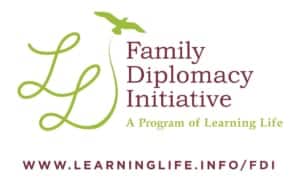The Model Family Diplomat
This article is part of a series developing the idea of family diplomacy, starting with the 2019 article, “Families: A New Voice for a More Caring World.” For other articles in the series, visit the FDI program page.
 What does the model or ideal family diplomat (FD) look like? In making the case for family diplomacy, it is well worth developing an ideal FD to which existing FDs can aspire, and to guide Learning Life’s work building the international training and network FDs will need to thrive. This article is a start toward answering that question.
What does the model or ideal family diplomat (FD) look like? In making the case for family diplomacy, it is well worth developing an ideal FD to which existing FDs can aspire, and to guide Learning Life’s work building the international training and network FDs will need to thrive. This article is a start toward answering that question.
In explaining what FDs should be, I often raise the 3 C’s: caring, capable, and connected. Here’s what each entails.
#1: Caring
In a world so often filled with uncaring, FDs should be caring, both in how they think and behave. Caring means at least four things. First, active listening: model FDs area genuinely curious and keen to learn about their world, especially the families they represent — their needs, concerns and aspirations, and how different issues affect them. This means observing, asking questions, and recording information from observations and interviews. FDs’ legitimacy, like that of elected officials, crucially depends on how well they know the families or constituents they represent, so active listening is essential.
Second, model FDs think and behave empathically. Empathy — the ability to understand and feel for those different from you — is vital for communication and collaboration in a modern, globalizing world in which we are all intertwined, economically, yet distanced geographically and culturally. Hence, the best FDs have the mental and behavioral habits of “putting themselves in others’ shoes” as best they can.
Third, model FDs value family, democracy and diplomacy in thought and practice. Their concept of family is open, focused on caring more than composition, that is, on encouraging the caring relationships that make strong families more than defining who composes a legitimate family. Ideal FDs value democracy, which among other things, means that (a) everyone should have meaningful if not equal voice and influence in the decisions that affect their lives, and (b) everyone should have opportunities to develop themselves, and to participate in collective self-government. Model FDs value diplomacy, which can be defined simply as the art of getting along and collaborating with others across lines of difference.
Fourth, caring means taking action to advance families, democracy and diplomacy. Model FDs don’t just talk, they do. Doing involves a lot of talking, but good FDs engage in directed talk. In contrast with directionless talk, which may feel good but leads nowhere, directed talk is self-consciously oriented toward short and long-term goals, in our case, to expand family diplomacy.
#2: Capable
To care effectively, FDs need to be capable. FDs can strengthen their capabilities in at least two ways: by increasing their knowledge, and by developing their skills.
Model FDs are knowledgeable and routinely learn about family definitions, patterns, trends, and issues, especially of those families they represent. They are also knowledgeable and routinely learn about international news in order to understand the forces in the world, and the relevant landscape of power (i.e., the varied individuals, networks, organizations and governmental bodies) that affect families. There is clearly a lot to know on these topics, but model FDs need not be experts or scholars. Rather, they are routinely, ideally daily, reading, listening and watching reputable news and data sources, as well as observing and interviewing (as noted above, as part of active listening) to build their knowledge.
Model FDs are skilled, above all, in community organizing, that is, the ability to move people to action. Community organizing involves a compound of skills including public speaking, storytelling, writing, recruiting, training, moderating, sustaining, inspiring, and fundraising from individuals and groups, among other skills.
#3: Connected
Social scientists use the concept of “social capital” to refer to how many people you know, how well you know them, and how much you trust and cooperate with them. In a word, social capital is your connections or network, and the size and strength of your network, or the amount of social capital you have, significantly shapes your cultural, economic and political power, not to mention your health. Hence, everyone should have an interest in developing their social capital, and model FDs routinely, consciously cultivate that capital.
The ideal FD energetically and patiently cultivates their connections to three groups in particular: the families they represent, their fellow FDs, and institutional powers, that is, the media, nonprofit, business and government organizations through which FDs can influence policy for the benefit of families.
Paul Lachelier, Ph.D.
Founder & Director, Learning Life

